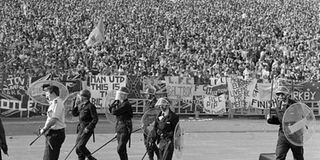Heysel and the death of English hooliganism

A file photo taken on May 29, 1985 shows Belgium policemen facing British fans at Heysel football stadium in Brussels. May 29 marks the 30th anniversary of the day 39 people died when a wall collapsed after Liverpool fans charged their Juventus counterparts prior to the 1985 European Cup final at the run-down Heysel Stadium. PHOTO | DOMINIQUE FAGET |
What you need to know:
- Friday marks the 30th anniversary of the day 39 people died when a wall collapsed after Liverpool fans charged their Juventus counterparts prior to the 1985 European Cup final at the run-down Heysel Stadium in Brussels.
- Williams says that although "smaller hooligan gangs" still operate away from stadiums, violence inside grounds at Premier League level has become "very unusual".
LONDON
The Heysel stadium disaster was one of the blackest days in English football history, but it also prepared the ground for the sport's spectacular rebirth in its ancestral home.
Friday marks the 30th anniversary of the day 39 people died when a wall collapsed after Liverpool fans charged their Juventus counterparts prior to the 1985 European Cup final at the run-down Heysel Stadium in Brussels.
In England, still reeling from the Bradford fire 18 days earlier, which had seen 56 people perish at Bradford City's dilapidated Valley Parade ground, the reaction was one of shock, anger and disbelief.
The Daily Mirror called it "the day the football died", while prime minister Margaret Thatcher declared war on "the hooligan problem", which had bedevilled English football, at home and abroad, for over a decade.
John Williams, an expert on football fan behaviour from the University of Leicester, describes it as "a moment of deep national shame".
At Thatcher's behest, the Football Association suspended English clubs from European competition for a year.
European governing body UEFA went further still, announcing a five-year ban on English clubs and an indefinite suspension for Liverpool that would last until 1991.
An inquiry into what had happened at Bradford and Heysel — as well as a riot at Birmingham City's St Andrews stadium in which a 15-year-old boy died — led by leading judge Oliver Popplewell resulted in new, wide-ranging public order powers for police.
Recorded incidents of hooliganism sloped off, while attendances in the English Football League the following season slumped to a post-war low of 16.5 million.
But the lessons of Heysel were only partially learnt and four years later, on April 15, 1989, tragedy befell English football again at Sheffield Wednesday's Hillsborough stadium.
Anxieties about violence had spawned a culture of poor crowd management and over-aggressive policing, which led to 96 Liverpool supporters being horrifically crushed to death after they were herded into over-crowded pens prior to an FA Cup semi-final against Nottingham Forest.
GENTRIFICATION
Another report by another judge, this time Peter Taylor, found serious failings in the police's handling of the tragedy and ushered in the all-seater stadiums with which the English game is now synonymous around the world.
"Heysel and Hillsborough sparked a wider understanding in this country that the game was culturally important, but run through with fan-behaviour problems, lacked an effective voice for the non-hooligan customer, was being ineptly managed and was poorly served by the police and government," Williams told AFP.
"Stadia in England were quickly modernised after Hillsborough, the game was opened up to new supporters and fan behaviour improved and was more effectively managed."
Closed-circuit television, the segregation of rival fans, a ban on alcohol and the use of stadium banning orders, allied to a process of gentrification caused in part by spiralling ticket prices following the advent of the Premier League in 1992, have largely forced hooligans out of English stadiums.
There are isolated incidents — such as when Millwall fans shockingly fought between themselves inside Wembley during an FA Cup semi-final in 2013 — but the pitched battles of the 1970s and 1980s have faded into memory.
Williams says that although "smaller hooligan gangs" still operate away from stadiums, violence inside grounds at Premier League level has become "very unusual".
While Heysel played an important role in English football's renewal, it also left a damaging sporting legacy.
There had been seven English European Cup winners in the eight years immediately prior to Heysel, but the ban on English clubs denied teams such as Howard Kendall's Everton a chance to fulfil their potential.
It would not be until 1999, when Manchester United beat Bayern Munich in Barcelona, that an English club would reach a European Cup final again and it would be another half-decade before teams from England began to make routine appearances in the competition's latter stages.





